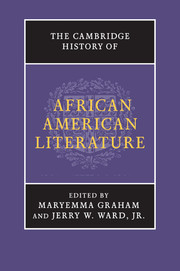Book contents
- Frontmatter
- Introduction
- PART I AFRICAN AMERICAN LITERATURE FROM ITS ORIGINS TO THE TWENTIETH CENTURY
- PART II AFRICAN AMERICAN LITERATURE IN THE TWENTIETH CENTURY
- 12 Foundations of African American modernism, 1910–1950
- 13 The New Negro Movement and the politics of art
- 14 African American literature and the Great Depression
- 15 Weaving jagged words: the black Left, 1930s–1940s
- 16 Writing the American story, 1945–1952
- 17 Geographies of the modern: writing beyond borders and boundaries
- 18 African American literature by writers of Caribbean descent
- 19 Reform and revolution, 1965–1976: the Black Aesthetic at work
- 20 History as fact and fiction
- 21 Redefining the art of poetry
- 22 Cultural resistance and avant-garde aesthetics: African American poetry from 1970 to the present
- 23 New frontiers, cross-currents and convergences: emerging cultural paradigms
- PART III AFRICAN AMERICAN LITERATURE AS ACADEMIC AND CULTURAL CAPITAL
- Bibliography
- Index
- References
18 - African American literature by writers of Caribbean descent
from PART II - AFRICAN AMERICAN LITERATURE IN THE TWENTIETH CENTURY
Published online by Cambridge University Press: 28 May 2011
- Frontmatter
- Introduction
- PART I AFRICAN AMERICAN LITERATURE FROM ITS ORIGINS TO THE TWENTIETH CENTURY
- PART II AFRICAN AMERICAN LITERATURE IN THE TWENTIETH CENTURY
- 12 Foundations of African American modernism, 1910–1950
- 13 The New Negro Movement and the politics of art
- 14 African American literature and the Great Depression
- 15 Weaving jagged words: the black Left, 1930s–1940s
- 16 Writing the American story, 1945–1952
- 17 Geographies of the modern: writing beyond borders and boundaries
- 18 African American literature by writers of Caribbean descent
- 19 Reform and revolution, 1965–1976: the Black Aesthetic at work
- 20 History as fact and fiction
- 21 Redefining the art of poetry
- 22 Cultural resistance and avant-garde aesthetics: African American poetry from 1970 to the present
- 23 New frontiers, cross-currents and convergences: emerging cultural paradigms
- PART III AFRICAN AMERICAN LITERATURE AS ACADEMIC AND CULTURAL CAPITAL
- Bibliography
- Index
- References
Summary
They dubbed it the Port of No Return. When their ancestors left that port at Elmira Beach, Ghana – or Goree Island, Senegal, or any of a number of similar African ports – and set out on the perilous journey over the ocean to the Americas, there was no going back for the New World Negroes. That is what for most Africans in the Americas was the beginning of their history. Whether resident in a small island nation or in the American colonies, whether under the domain of a British, Spanish, French, or Dutch colonial power, and whether shuttled back and forth between several of the above, New World Negroes were tied together by a history of displacement and slavery. However, for them, national domains, language barriers, and geographical boundaries were not as defining and absolute as they were for their European masters. Rather, their boundaries and borders were established by race. The best-known early work of the African Diaspora appropriately stands as the prototype of diasporic writings across borders, Olaudah Equiano's The Interesting Narrative of the Life of Olaudah Equiano, or Gustavus Vassa, the African, the 1789 autobiography of an African seeking to survive the Middle Passage, assert his name, vindicate his culture, define his identity, justify his very being, establish his relationship to fellow Africans in the throes of a slave system that viewed Africans as merchandise, and establish a place for himself in a colonial society.
- Type
- Chapter
- Information
- The Cambridge History of African American Literature , pp. 377 - 404Publisher: Cambridge University PressPrint publication year: 2011



